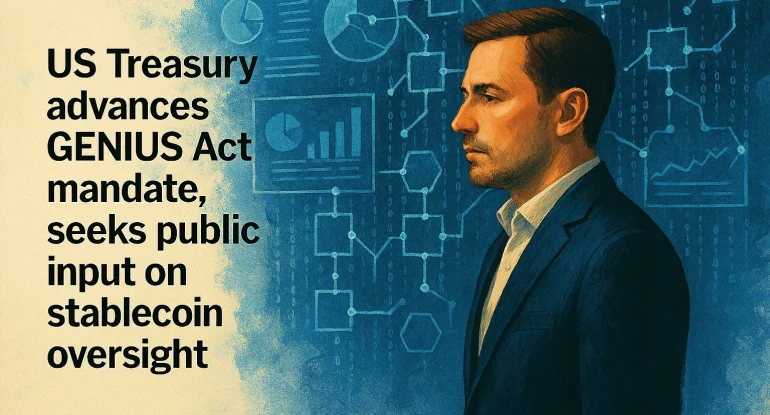US Treasury Accelerates GENIUS Act, Requests Public Input on Stablecoin Oversight

US Treasury advances GENIUS Act mandate, seeks public input on stablecoin oversight
Key Takeaways
- The Treasury Department has opened public comment on stablecoin oversight under the GENIUS Act.
- Stablecoin issuers must maintain full reserves, offer regular audits, and comply with anti-money laundering standards under the new law.
US Treasury advances GENIUS Act mandate, seeks public input on stablecoin oversight as it opens a public comment period on its implementation. The Treasury released a formal request to stakeholders to shape the rules for stablecoins under the new law.
Stakeholders are invited to propose cutting‑edge tools—such as APIs, AI‑driven surveillance, digital‑identity checks, and advanced blockchain analytics—to spot fraud and money‑laundering risks. Responses are due by October 17, coinciding with the 60‑day public review window announced in the Federal Register.
Treasury Secretary Scott Bessent highlighted on X that the GENIUS Act is designed to cement U.S. leadership in the digital‑currency arena, driving worldwide appetite for dollar‑backed stablecoins—and potentially boosting Treasury buying activity.
“It’s a win‑win‑win for everyone involved: stablecoin users, stablecoin issuers, and the US Treasury Department,” Bessent stated.
The GENIUS Act became law on July 18 when President Donald Trump signed it, marking a milestone in U.S. cryptocurrency regulation.
Sponsored by Senate Banking Committee Chair Tim Scott and championed by Sen. Bill Hagerty, the law institutes a dual federal‑state oversight framework for stablecoin issuers.
“With GENIUS becoming law, the US is stepping boldly into the future of finance with a clear signal that responsible innovation is not only welcome but essential,” Avery Ching, CEO and co‑founder of Aptos Labs, said in a statement.
The framework permits only selected payment‑stablecoin issuers—PPSIs—to release coins after an initial grace period, with full roll‑out slated for November 2026.
The legislation mandates that issuers hold complete reserves, undergo periodic audits, and adhere to stringent transparency norms. It also secures coin holders with priority repayment rights in insolvency scenarios and obliges compliance with anti‑money‑laundering and anti‑terrorism sanctions.
“The momentum we’re seeing today, from stablecoins to tokenized assets, is just the beginning of what’s possible with the right policy foundations in place,” Ching added. “This new stablecoin law will help unlock technologies that will transform how value moves around the world, expand access to the financial system, and unlock new economic opportunities for millions. We’re just scratching the surface of what’s possible.”









